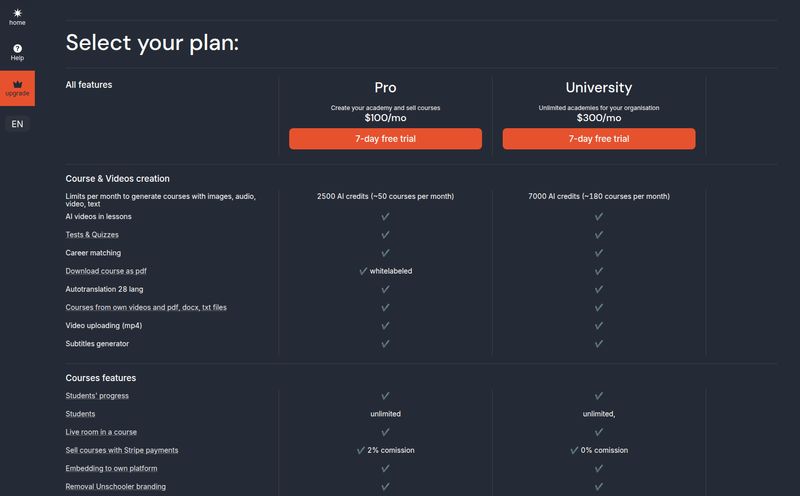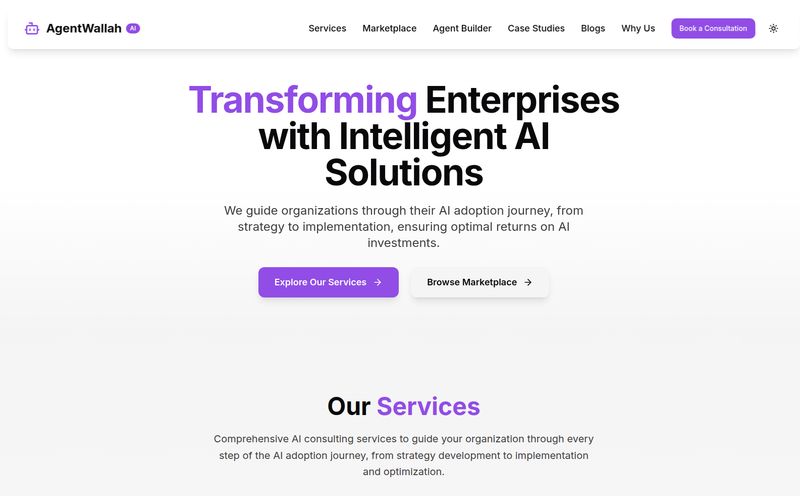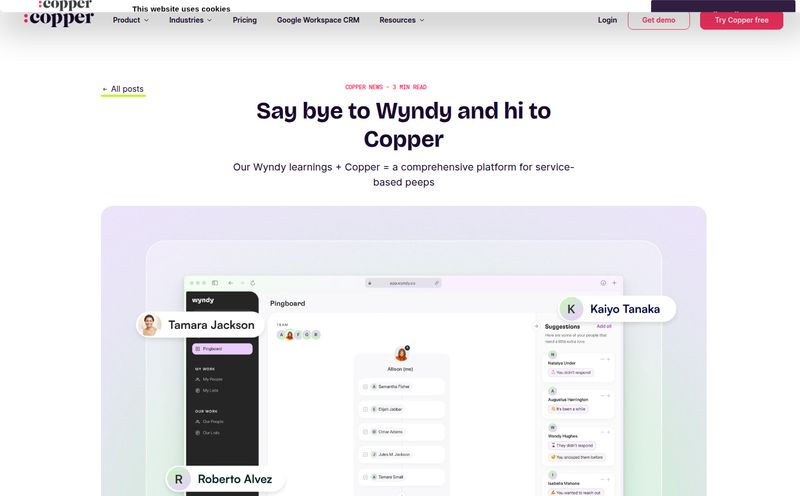If you’re anything like me, your to-do list is less of a list and more of a… well, a digital monster. It’s a sprawling beast with tentacles reaching into Asana, sticky notes on my monitor, half-forgotten reminders in Slack, and that one ambitious Trello board from 2022 that I’m too scared to delete. Every Monday, I look at it and a part of my soul just withers. We’re told to be productive, to optimize, to hustle. But mostly, it just feels like drowning in tasks.
So, when a new tool pops up waving the “AI-Powered” flag, my inner cynic and my desperate, over-caffeinated optimist have a little duel. The cynic scoffs, “Great, another app to forget to use.” But the optimist whispers, “What if… what if this is the one?”
Today, that duel is over a new contender named MindGenie. It claims to be an AI-powered virtual assistant designed to wrangle our chaotic workloads. But does it have the magic to actually grant our productivity wishes? I decided to take a look.

Visit MindGenie
What Exactly is MindGenie Supposed to Do?
At its heart, MindGenie isn’t trying to reinvent the wheel. It's a task manager. But its secret sauce is the AI simmering under the surface. Instead of you just dumping tasks into a list and hoping for the best, MindGenie steps in like a super-smart (and hopefully, not-too-bossy) assistant. It looks at your mountain of work and says, “Okay, I can help with this.”
The whole idea is to automate the annoying parts of planning. The parts that we all know we should do but often skip in the name of just “getting started.” You know, like figuring out how long something will actually take, or breaking a giant, scary task like “Launch New Website” into smaller, less terrifying pieces.
The Core Features: A Peek Under the Hood
From what I’ve gathered, MindGenie is focusing on a few key areas where AI can really make a difference. It’s not about a million bells and whistles; it’s about targeted intelligence.
The AI Time Lord: Automatic Duration Estimates
This is the first feature that caught my eye. MindGenie uses AI to estimate how long a task will take you. This is… ambitious. As an SEO, I know that “Write a blog post” can take anywhere from two hours to two days, depending on the topic, research needed, and how many times my cat decides my keyboard is a nice place to nap.
I’m fascinated by this. If the AI is smart enough to learn from your habits, it could be a game-changer for realistic planning. But if it’s just making generic guesses, it could be more frustrating than helpful. The potential is huge, but the jury is still out on the execution. A tool that can accurately predict my own procrastination? Now that would be something.
Eating the Elephant, One AI-Generated Bite at a Time
Okay, this is the one I’m genuinely excited about. MindGenie has an automatic task breakup feature. You give it a big, hairy, audacious goal, and the AI is supposed to chop it up into manageable subtasks. This is classic productivity advice—break it down!—but the friction of actually doing it is what stops most of us.
Imagine typing in “Create Q3 Content Strategy” and having it automatically spit out subtasks like: “Research competitor keywords,” “Analyze last quarter’s top-performing content,” “Brainstorm 10 blog topics,” and “Draft content calendar.” That’s not just a time-saver; it’s a motivation-saver. It turns a daunting task into a clear roadmap. That’s a genie I’d love to have on my team.
The Google Calendar Question Mark
Here’s the rub. For a task manager to truly become the center of your universe, it needs to talk to your calendar. MindGenie knows this, and a Google Calendar integration is apparently on its way. Soon. For now, though, it’s not there. This is a bit of a downer, I won’t lie. It’s like having a brilliant assistant who refuses to look at your schedule. The potential for a truly seamless workflow is massive once this gets implemented, but for now, it's a significant piece of the puzzle that's missing.
My Honest Take: The Good, The Bad, and The AI
So, putting it all together, what’s my gut feeling? Well, it’s a mixed bag of excitement and a healthy dose of “we’ll see.” The core concept is fantastic. Focusing AI on the most painful parts of planning—estimation and task decomposition—is smart. It’s easy to get lost in the sea of AI tools that just re-skin ChatGPT, but this feels like a genuinely thoughtful application of the tech. The promise of an easy-to-use interface that automates the grunt work is incredibly appealing.
On the flip side, the reliance on the AI’s accuracy is a double-edged sword. If its time estimates are off, it could do more harm than good. And the biggest hurdle right now is its newness. Information on advanced features is a little scarce, and the crucial Google Calendar integration is still a promise. It feels like we're looking at the blueprint for a fantastic car, but we can't quite take it for a test drive yet.
Who Is This Tool Actually For?
Based on its feature set, I don’t think MindGenie is trying to replace complex project management systems like Jira or a decked-out Asana workspace. Not yet, anyway.
I see this being perfect for:
- Freelancers and Solopreneurs: People like me who are juggling multiple clients and projects and need a smart system to keep them on track without a lot of administrative overhead.
- Students: Breaking down “Write a 20-page thesis” into actual steps could be a lifesaver.
- Small Teams: For coordinating tasks on a smaller scale, where a simple, intelligent system is more valuable than a complex, feature-heavy platform.
It’s for the person whose main problem isn’t managing a team of 50, but managing the 50 tabs open in their own brain.
What's the Damage? A Look at MindGenie's Pricing
This is the million-dollar question, isn't it? As of right now, there’s no public pricing information for MindGenie. This isn’t too surprising for a tool that seems to be in its very early stages.
If I were to put on my industry analyst hat, I'd wager they might go for a freemium model. Perhaps a free tier with a limited number of tasks or projects, and a premium subscription (maybe in the $5-$10/month range) that unlocks unlimited use and advanced features like the Google Calendar integration when it lands. This is pure speculation, of course, but it would fit the market. For now, we'll have to wait and see.
Is It Worth The Hype?
MindGenie is dripping with potential. It’s targeting a real, universal pain point with a smart, modern solution. It’s not just another to-do list; it’s an attempt at a genuine thinking partner. I'm cautiously optimistic. I’ve signed up to be notified, and I’m genuinely curious to see if this genie can live up to its promises. It’s definitely one to watch in the ever-growing space of AI productivity tools.
Frequently Asked Questions about MindGenie
What is MindGenie?
MindGenie is an AI-powered task management tool designed to act as a virtual assistant. It helps you organize your work by automatically estimating how long tasks will take and breaking large projects into smaller, more manageable subtasks.
How does the AI task breakdown work?
You provide the tool with a large or complex task (e.g., "Plan a marketing campaign"). The AI then analyzes the task and generates a logical list of subtasks required to complete it, effectively creating a ready-made checklist for you.
Can I use MindGenie with Google Calendar?
Not yet. The developers have announced that Google Calendar integration is a planned feature and will be coming soon. As of now, it operates as a standalone application.
Is MindGenie free?
There is currently no public pricing information available for MindGenie. It's likely the tool is in a pre-launch or early beta phase. A pricing model, possibly including a free tier, will likely be announced closer to its full launch.
Who should use MindGenie?
MindGenie appears best suited for individuals like freelancers, students, and solopreneurs, or small teams who need help organizing and prioritizing their own workload without the complexity of large-scale project management software.
Is the AI's time estimation reliable?
The reliability will likely depend on the sophistication of the AI and its ability to learn from a user's behavior. While the goal is accuracy, users should probably treat the initial estimates as helpful guidelines rather than absolute deadlines until the system proves itself.
The Final Word
In a world saturated with productivity apps, MindGenie has a genuinely interesting hook. By using AI to tackle the pre-planning phase of work, it could carve out a unique and valuable niche. It’s a bold promise: to not just store your tasks, but to help you think through them. I have my reservations, particulalry about the current lack of integrations, but I’m rooting for it. Anything that can bring a little more order to the chaos is a friend of mine. We'll have to see if this genie is the real deal.
Reference and Sources
- For more on how AI is shaping personal productivity, check out this article on the future of work from Forbes.



